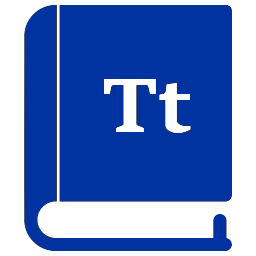Tab - Timpani
Tin whistle - Tutti
Tab - abbreviation: shortened version of the word 'tablature'
Tablature - sheet music written specifically for stringed instruments which uses one line for each string, numbers, letters, and other symbols in place of standard notation; the staff for stringed instruments which uses numbers for notes to indicate the fingering location of the notes
Tacet - (Latin) "is silent"; instructs the performer to remain silent for a specified duration of time
Tacet al fine' - (Latin) "is silent to the finish"; directive to the performer to stay silent for the remainder of the composition
Taffelmusik - (German) "table music"; 16th century music for performance at a banquet, dinner, or feast
Taille - (French) "middle voice"; term used in French music for a tenor vocal or instrumental part; a mid 17th century alto oboe and tenor oboe of the Baroque
Tambour - (French) "drum"; a tambourine with no jingles
Tambourine - (French) "open-drum"; a round open-ended hand drum with animal hide or other material stretched over a frame with small cymbals (jingles)
Tampon - a double-head drumstick used to play rolls on the bass drum
Tango - (Portuguese) "to touch"; a music and dance originating in early 20th century Argentina comprised of dramatic music and erotic dance styles; term originating in South America from African slave trade
Tanto - (Italian) "so much"; 'as much' relating to the written direction
Tasto, tastiera - (Italian) "key"; a directive written in musical scores indicating that a note or passage is played alone on the fretboard instrument (violin or cello) or the piano keyboard, without harmonic accompaniment
Tasto solo - (Italian) "single key"; a directive of the 'basso continuo' denoting that the music is to be played by only the bass instrument
Tattoo - a form of military music originating with the 17th century Dutch; the military bugle and drum call to soldiers to return to the barracks; a military musical performance or armed forces display; see also 'tap toe'
Tap toe, taptoo - (Dutch) "tap off"; military drum call telling the bartender to stop serving beer and soldiers to return to their barracks during the 16th to 17th century Belgium and Netherlands; see 'tattoo'
Te Deum - (Latin) "we praise you, oh God"; Ambrosian hymns written and sang in the 6th to 8th century Latin church
Temperament - the practice of tuning scales so as to make the tones sound harmonic with one another; a tuning system used to bring 'fixed tone' instruments into 'true tone' such as the organ or harpsichord
Tempo - (Italian) "time"; the speed of the music's beat and rhythm as indicated by the meter or metronome mark written or the count given by the conductor
Tempo di marcia - (Italian) "march in time"; march tempo
Tempo di mezzo - (Italian) "in half time"; the middle section of a double aria
Tempo giusto - (Italian) "in exact time"; play in strict time
Tempo rubato - (Italian) "robbed, steal time"; a method of freestyle harmonious playing abandoning strict time for speeding up or slowing down at will
Tempo ordinario - (Italian) "ordinary time"; a directive to play at the normal common-time or 4/4 time, no faster or slower
Tendre - (French) "tender"; play tenderly with emotion; heartfelt
Tendrement - (French) "tenderly"; play tenderly from the heart; tendre
Tenor - (Latin) "to hold"; the highest pitched male voice or instrument just above baritone and below countertenor or alto
Tenoroon - a rare nearly obsolete double-reed tenor bassoon of the Renaissance, also called the octave bassoon
Tenuto - (Italian) "to hold, held"; directive to sustain a note or group of notes for their full time value or slightly longer
Tendre, tendrement - (French) "tenderly"; directive to play tenderly
Tenerezza - (Italian) "tenderly"; directive to play tenderly
Ternary - (Italian) "three at once"; with three parts; a three part musical form represented by the letters ABA
Tierce de Picardie - (Italian) "pointed third"; a major third of the tonic applied in a modal or minor key by raising the minor triad by a semitone to a major triad; also known as a 'Picardy third'
Texture - the structure of a composition and its parts in relation to one another
Theme - the main musical idea of a composition which the different parts and passages all have in common; the idea upon which a composition is based
Trenody - (Greek) "wailing"; a song of lamentation, normally for a death
 Tie - direction to play two or more notes of identical pitch as one; notation symbol of a curved line above notes
Tie - direction to play two or more notes of identical pitch as one; notation symbol of a curved line above notes
Timbre - the harmonic and dynamic character of sound; the sound quality
Time - the count or beat of the music; the beat noted by the time signature; in Jazz music, directive of 'a tempo,' "return to original tempo"
Time signature - a fractional number placed on the staff after the clef which indicates the number of beats per measure (top numeral) and which notes (lower numeral) carrying that beat; the count and note value of a composition
Timpani - kettledrum; the only drum which can be tuned; a large copper drum with tuning screws for its cover and a pedal which changes its pitch on the fly
Tin whistle - a small tubed wind instrument constructed of tin or steel with six finger holes for changing notes
Tosto - (Italian) "at once, quick"; rapidly
Toccata - (Italian) "to touch"; a 16th century musical form written for keyboard, organ originally, which showcases the performers dexterity on the instrument
Tombeau - (French) "tomb"; an instrumental composition written to lament or commemorate a death
Tom - Anglo-Indian drums ranging from 6 to 24 inch diameter added to the stage drum kit in the early 20th century
Tom-tom - an African family of drums of various pitches
Tone - a sound of a specific pitch; an interval of two semitones; sound character
Tranquillo - (Italian) "quiet"; play in a calm or peaceful manner; tranquil
Transcription - an arrangement or rearrangement of a composition for an instrument other than that for which it was written; see also transpose
Transpose - to play a piece of music in a key or octave other than that written to accommodate the instrument used
Trattenuto - (Italian) "restrain, held back"; to hold back the tempo yet sustain the sound, similar to ritardando
Travesty, travesti - (Greek) "cross-dress"; an opera actor dressing in garments of the opposite sex; an opera singer playing a part of the opposite sex
Treble - the highest pitched instruments or parts of a composition
 Treble clef - musical notation indicating the pitch instrument for which the music is written; the clef used for the highest pitched voices and instruments; Right: treble clef
Treble clef - musical notation indicating the pitch instrument for which the music is written; the clef used for the highest pitched voices and instruments; Right: treble clef
Tre corde - (Italian) "three strings"; keyboard directive to release the soft pedal
Tremolo - (Italian) "trembling"; a rapid alternation of adjacent notes creating a trembling effect (not to be confused with vibrato which is a rapid alternation of the pitch of a single tone)
Tresillo - (Spanish) "three sides"; a duple rhythmic pattern used in Latin music in the habanera; cinquillo; the rhythmic basis of African and Afro-Cuban drums
Triangle - a percussion instrument constructed of a metal rod bent into an open triangle which produces a ringing tone when struct with a metal stick
Trillo - (Italian) "trill"; a rapid alternation of a sung or played note wavering with tone immediately above it; notation indicating a trill; see also trill
 Trill - a rapid alternation of a sung or played note wavering with tone immediately above it; notation indicating a trill
Trill - a rapid alternation of a sung or played note wavering with tone immediately above it; notation indicating a trillTrio - a group of three singers or instrumentalists; music written for three performers; a contrasting central section of a minuet, scherzo, or march
Triple meter - a meter of three; time signature of 3/4; uneven meter
Triplet 1 - a tuplet (set of three) of notes played or sung with an equal significant accent and time value
Triplet 2 - a tuplet of notes played or sung in the time value of two
Triste - (Latin, Old French) "sad, mournful"; sad or mournful; regretful longing
Troubairitz - (French) a female troubadour or minstrel singer of romantic poetry, lyrics, or songs from 11th to 13th century France and Italy
Trombone - (Italian) "large trumpet"; a long slender brass wind instrument with a telescoping slide and/or valves for changing the pitch or notes, played by blowing air into and vibrating the lips against the mouthpiece
Troppo - (Italian) "too much"; suffix used for intensity as in both non troppo ('very much') or allegro non troppo ('not as much,' 'not as fast'')
Troudadours - (French) a traveling minstrel, storyteller or lyric poet musician of Occitan poetry from the High Middle Ages (10th to 13th century) Europe, mainly France and Italy or Spain
Trouvère, trouvèur - (French) "to compose"; poet and lyric composers of 10th to 13th century Europe inspired by the Trouabours
Trumpet - (Old French) "trump"; a brass tubed wind instrument with valves for changing pitch or notes played by blowing air into while vibrating the lips against the mouthpiece used since the 14th century Renaissance up to today in music of most genres from Classical music to modern Jazz
Tuba - (Latin) "trumpet," (Italian) "bass"; the lowest pitched brass instrument; a large brass wind instrument constructed of tubes of brass, fiberglass or other material with valves for changing the pitch or notes which provides bass accompaniment to marching bands and orchestras since the mid 19th century
Tubular bells - a set of hanging metal tubes which chime when struck
Tune - to measure or adjust an instrument's pitch to the desired frequency
Tuning - to regulate the pitch of an instrument via mechanical adjustment
Tuning fork - an elongated u-shaped steel rod with a handle produces a definitive tone when struck against an object
Turn - notation placed above a note directing the musician to play a short figure (musical phrase) consisting of the note, the note above, and the note below it, may be inverted; see ornamentation
Tutti - (Italian) "all"; instruction for all performers to join in; a musical piece or section written for all voices and instruments in the orchestra or musical group


